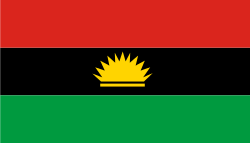Politics, Militarisation And Future Of Democracy In Nigeria
Francis Abayomi
Ongoing debates regarding the military exercise codenamed “Operation Python Dance” in the southeast region essentially boil down to genuine concerns over the role of the military in managing internal conflicts. The worry is not just about the declining culture (maybe lack of it) of civil-military relations but essentially about how militarisation could exacerbate or deepen the colouration of ethnic and sectarian politics. Eighteen years after restoration of democracy following a long spell of military rule, it remains a huge challenge that institution of the military was yet to be fully attuned to what should be its primary role in a democratic setting.
There is no denying that it is indeed within the limit of a sovereign state to deploy legitimate use of force within its recognised territorial space. It however remains largely contentious whether a legitimate democratic authority could resort to the use of military might, without absolute regards for the rights and dignity of citizens who are not just the repository of democratic power but who also constitute the sovereignty that defines the state and from which the leadership derives its legitimacy. While it is no longer news that the Nigerian military has acquired the reputation of highhandedness and viciousness against unarmed and harmless citizens of the federal republic in the series of its operation supposedly aimed at restoring order, the concern however remains that there is yet no assurance that such widely acquired notoriety would be accorded proper attention by the relevant democratic institutions with the view to put an end to the national shame it constitute.
Long years of military incursion into the arena of politics may have accounted for the pervasive culture of militarisation that has manifested in diverse dimension of atrocious disregards for the etiquettes of civil-military relations. The challenge however must however be seen from the character of politics which has remained manifestly under the firm grip of a domineering class whose political characters were nurtured and continued to be sustained by militarism. While militarisation of politics has become a peculiar feature of nations where nationality question portends continuous struggle for space and relevance amongst the component entities, the depth of the challenge as in the case with Nigeria has however come to reflect the complexity of ethnic politics which fuels sub-national solidarities. Indeed, the crisis that led to Nigeria civil war between 1967 and 1970 was not without the failure to deal with fears of ethnicization and partisanship of the military. In recent times however, it would appear not much lessons have been learnt with regards to how undue militarisation ignited the scourge of militancy and terrorism in the Niger Delta and the North-East respectively.
It a well known fact that military rule in Nigeria was never to the exclusion of the civilian political class. Indeed, for a long time, military rule remained a convenient way of sustaining the alliance between political actors within the military and the civil space. To this extent, the deployment (or failure to do so) of military in recent times cannot be without legitimate suspicions and apprehension. The politics of brutality orchestrated through the Nigerian military as seen in the dying days of autocracy when prodemocracy movements assumed an irreversible momentum was largely informed by the dominant reason of sustaining instrumentality of force within the purview of power oligarchies. To a large extent, the dynamics of power in relation to the deployment of military might has only marginally changed since 1999.
It is therefore within the foregoing context that the deployment of military as a force of subjugation or the denial of it for curious reasons must be understood. It is therefore not out of exaggeration for people to wonder why the military will be so swift in deploying instrument of force against members of the Indigenous Peoples of Biafra (IPOB) while murderous herders roam the length and breadth of the country. It would remain curious and if not hard to be discountenance when the correlation is drawn between the audacity of “Operation Python Dance” and the seeming lethargy displayed by military authority in deploying force against militias that prowled and visited anarchies on communities in Benue States and Southern Kaduna for well over a year. With the debate raging and likely to remain in the political conversation for a long time, it is evident that the image of the Nigerian military will continue to be battered on a two-fold dimension and from two-fronts; namely non-nationalistic nature of its operation as well as the appalling human rights record at the home front and abroad respectively.


